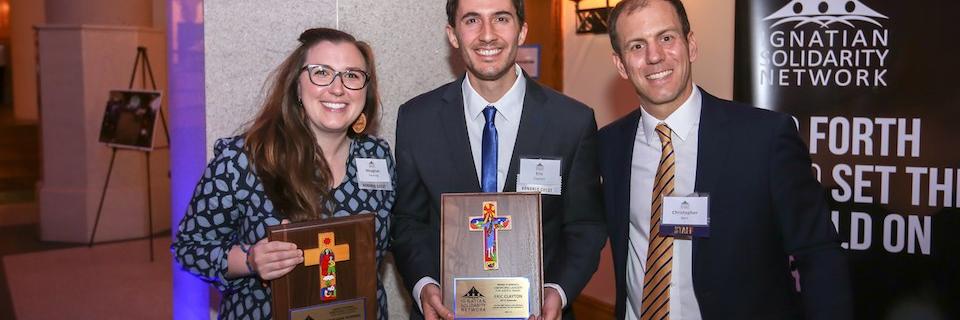Alumna Earns Honor from Ignatian Solidarity Network

A story about how her college search led her to Rockhurst says a lot about who Meaghan Fanning, ’12, is as a person.
She was undecided — interested in a number of different institutions but not sure about any of them. Then she saw the bell tower and its inscription from the Rev. Peter Hans Kolvenbach, S.J., calling on Jesuit educators to help shape students into servant-leaders committed to making the world a better place.
“I read that and thought to myself if this is what they’re shooting for me to become at the end of it, this is where I want to be,” she said. “if you accepted the options given at Rockhurst to expand your life focus and viewpoint to think outside of yourself, you would literally change. And I did — I left the University with this concept that my life belongs to other people as much as it belongs to myself.”
Knowing all that, it might not be surprising to learn that this month, the Ignatian Solidarity Network will honor Fanning with its Moira O’Donnell Emerging Leaders Award at its annual Ignite event in New York City, New York.
After graduating in 2012, Fanning began working at Jewish Vocational Service, a Kansas City-based organization providing a range of social services, including refugee resettlement. A year ago, she started the refugee youth program at the organization to serve the specific challenges that young refugees face for any number of reasons.
“At JVS, we were primarily working with the adults, but so many of the parents’ concerns were about their kids,” she said.
Today, the refugee youth program serves more than 140 young people in the Kansas City area from all over the globe — Myanmar, the Democratic People’s Republic of Congo, Syria, and from across Central America. Often, these clients are among the most vulnerable, sometimes arriving or resettled without other family members around.
Fanning said the program seeks to keep them on the path to be as successful as possible with the help of a social worker for both preventative work and intervention combined with a community-based approach.
“We try to be the last stop for some of these kids,” she said. “They need somebody to show up for them.”
It’s work that is sometimes easier to measure in its small successes, she said. But it’s work that is as rewarding as it is often challenging.
In addition to her work at JVS, Fanning also helps run Girls Group, a program at the Migrant Farmworkers Assistance Fund, helping young girls who are part of migrant worker families succeed. But she credits both her experience as a student, and that first glance at the bell tower’s call to “reflect on the upon the reality of the world around you with all its ambiguities, opportunities and challenges.”
“I have to credit Rockhurst first and foremost,” she said. “No question it was my four years here that put me on this path.”







